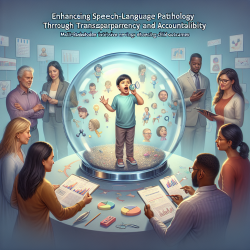Introduction
As professionals in the field of speech-language pathology, particularly those providing online therapy services to children, staying informed about the latest scientific advancements is crucial. The 2024 update on Environmental Epigenetics provides valuable insights that can enhance our understanding and practice. This blog post explores how these findings can be applied to improve therapy outcomes for children.
Understanding Environmental Epigenetics
Environmental epigenetics examines how external environmental factors influence gene expression without altering the DNA sequence. This field has grown significantly, shedding light on how these changes can affect health and development across generations. The 2024 update from the journal Environmental Epigenetics highlights the impact of environmental factors on genetic expression, which is particularly relevant for child development and therapy.
Key Findings from the 2024 Update
The 2024 update emphasizes two main areas:
- Epigenetic Transgenerational Inheritance: This concept suggests that environmental exposures can affect not just the individual exposed, but also subsequent generations. This has implications for understanding developmental delays and disorders in children.
- Environmental Epigenetics and Climate Change: The research underscores how climate change-related environmental stressors can influence genetic expression, potentially impacting child development and health.
Implications for Speech-Language Pathology
For practitioners at TinyEYE and similar organizations, these findings can inform therapy strategies in several ways:
- Holistic Assessment: Understanding the potential epigenetic influences on a child's development can lead to more comprehensive assessments. Consider environmental factors and family history when evaluating a child's speech and language development.
- Personalized Interventions: Tailor interventions by considering potential epigenetic factors. This personalized approach can enhance the effectiveness of therapy by addressing underlying environmental influences.
- Parental Guidance: Educate parents about the role of environmental factors in their child's development. Encourage healthy environmental practices that could positively influence genetic expression.
Encouraging Further Research
While the current findings are promising, continued research is essential. Practitioners are encouraged to stay updated on emerging studies in environmental epigenetics and consider participating in research initiatives. Collaboration with researchers can lead to innovative approaches that further enhance therapy outcomes.
Conclusion
Integrating insights from environmental epigenetics into speech-language pathology can lead to more effective and personalized therapy for children. By considering environmental influences, practitioners can better address the complexities of child development. For those interested in exploring the original research, the full article can be accessed here: Environmental Epigenetics 2024 update.










